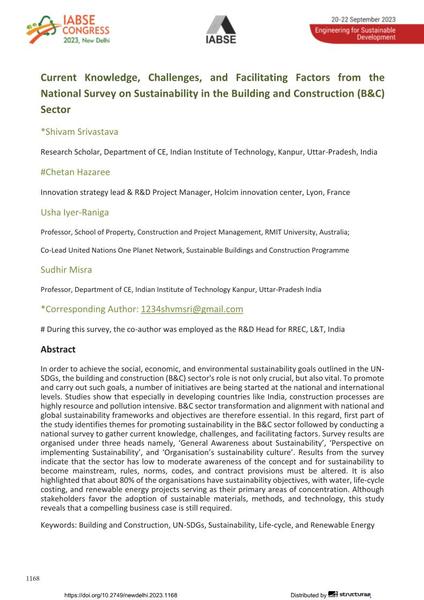Current Knowledge, Challenges, and Facilitating Factors from the National Survey on Sustainability in the Building and Construction (B&C) Sector

|
|
|||||||||||
Bibliografische Angaben
| Autor(en): |
Shivam Srivastava
(Research Scholar, Department of CE, Indian Institute of Technology, Kanpur, Uttar-Pradesh, India)
Chetan Hazaree (Innovation strategy lead & R&D Project Manager, Holcim innovation center, Lyon, France) Usha Iyer-Raniga (Professor, School of Property, Construction and Project Management, RMIT University, Australia; Co-Lead United Nations One Planet Network, Sustainable Buildings and Construction Programme) Sudhir Misra (Professor, Department of CE, Indian Institute of Technology Kanpur, Uttar-Pradesh India) |
||||
|---|---|---|---|---|---|
| Medium: | Tagungsbeitrag | ||||
| Sprache(n): | Englisch | ||||
| Tagung: | IABSE Congress: Engineering for Sustainable Development, New Delhi, India, 20-22 September 2023 | ||||
| Veröffentlicht in: | IABSE Congress New Delhi 2023 | ||||
|
|||||
| Seite(n): | 1168-1175 | ||||
| Anzahl der Seiten (im PDF): | 8 | ||||
| DOI: | 10.2749/newdelhi.2023.1168 | ||||
| Abstrakt: |
In order to achieve the social, economic, and environmental sustainability goals outlined in the UN- SDGs, the building and construction (B&C) sector's role is not only crucial, but also vital. To promote and carry out such goals, a number of initiatives are being started at the national and international levels. Studies show that especially in developing countries like India, construction processes are highly resource and pollution intensive. B&C sector transformation and alignment with national and global sustainability frameworks and objectives are therefore essential. In this regard, first part of the study identifies themes for promoting sustainability in the B&C sector followed by conducting a national survey to gather current knowledge, challenges, and facilitating factors. Survey results are organised under three heads namely, ‘General Awareness about Sustainability’, ‘Perspective on implementing Sustainability’, and ‘Organisation’s sustainability culture’. Results from the survey indicate that the sector has low to moderate awareness of the concept and for sustainability to become mainstream, rules, norms, codes, and contract provisions must be altered. It is also highlighted that about 80% of the organisations have sustainability objectives, with water, life-cycle costing, and renewable energy projects serving as their primary areas of concentration. Although stakeholders favor the adoption of sustainable materials, methods, and technology, this study reveals that a compelling business case is still required. |
||||
| Stichwörter: |
Nachhaltigkeit Lebenszyklus
|
||||
